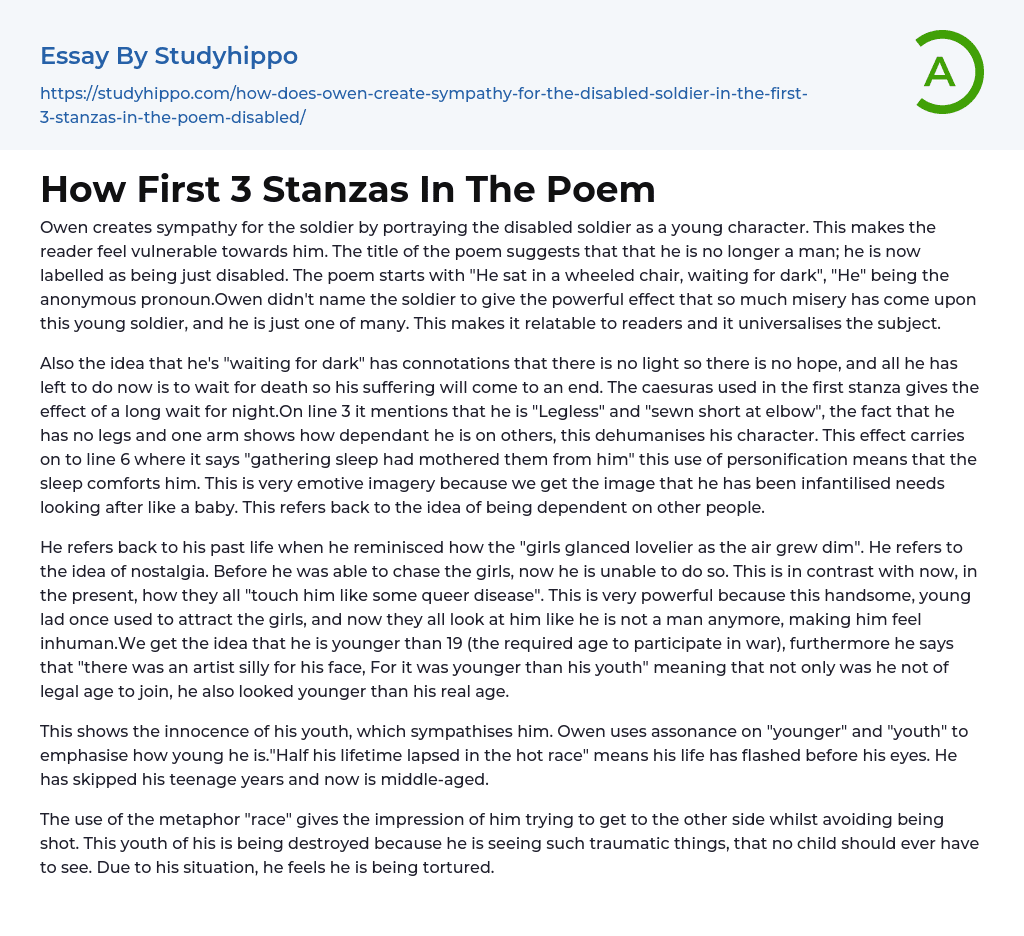Owen generates sympathy for the soldier in the poem by portraying him as a young, disabled character, which induces a sense of vulnerability in the reader. The title itself "Disabled" labels the soldier as merely handicapped, implying he has lost his identity as a man. The poem begins with an anonymous pronoun "He sat in a wheeled chair, waiting for dark," highlighting the soldier's physical limitations. Owen intentionally omits the name of the soldier to emphasize the magnitude of suffering that many soldiers underwent during war. This technique makes the situation of the soldier relatable to readers on a broader scale.
The connotation of waiting for dark implies that there is no light or hope, and the character's only option is to wait for death to end his suffering. The caesuras in the first stanza emphasize t
...he length of his wait. The fact that he is legless and has one arm; sewn short at elbow highlights his dependence on others, dehumanizing his character. This idea is reinforced in line 6 where "gathering sleep had mothered them from him," personifying sleep as a comforting force. This creates emotive imagery of the character being infantilized and needing care like a baby, highlighting his dependency on others.
The speaker reflects on his past, recalling how he used to admire the "lovely girls" as the day grew darker. Nostalgia is a theme that emerges in his reminiscence. Previously, he could pursue these girls, but now he cannot. In contrast, in the present, they approach him with very negative demeanors, as if he has some kind of "strange illness". This contrast is especially powerful because this attractive young ma
used to attract women, but now he feels like a non-person when they look at him. It is clear that the speaker is younger than 19 (the minimum age for joining the military), and he even remarks that "an artist was foolishly interested in his face because it looked younger than his actual age."
The innocence of his youth is depicted with sympathy by Owen through the use of assonance on the words "younger" and "youth". The phrase "Half his lifetime lapsed in the hot race" implies that his life has quickly passed by, skipping his teenage years and now finding himself in the middle-aged stage.
The metaphor of "race" creates an image of a person trying to avoid gunfire while crossing over. This traumatic experience is destroying the young person, who witnesses things that should never be seen by a child. As a result, the youth feels tortured by their circumstances.
- Boo Radley essays
- Genesis essays
- Richard iii essays
- Alice in Wonderland essays
- On the road essays
- Ozymandias essays
- The Nightingale essays
- Holden Caulfield essays
- Animal Farm essays
- 1984 essays
- A Hanging essays
- Shooting An Elephant essays
- A Tale Of Two Cities essays
- Adventures Of Huckleberry Finn essays
- Arthur Conan Doyle essays
- Brave New World essays
- Characters In Hamlet essays
- Characters In Romeo And Juliet essays
- Desdemona essays
- Diary Of A Wimpy Kid essays
- First-Person Narrative essays
- Frankenstein essays
- Heart Of Darkness essays
- Jane Eyre essays
- Jay Gatsby essays
- King Duncan essays
- Librarian essays
- Little Red Riding Hood essays
- Lord Of The Flies essays
- Silas Marner essays
- The Cask Of Amontillado essays
- The Catcher In The Rye essays
- The Crucible essays
- The Handmaid's Tale essays
- The Reader essays
- Virgil essays
- Wuthering Heights essays
- Candide essays
- Castle essays
- J. D. Salinger essays
- Ulysses essays
- Ethan Frome essays
- In Cold Blood essays
- Outliers essays
- Tuesdays With Morrie essays
- The Art of War essays
- Wife of Bath essays
- Huckleberry Finn essays
- The Lady With The Dog essays
- Great Expectations essays




